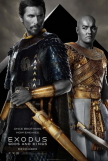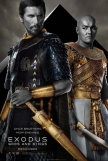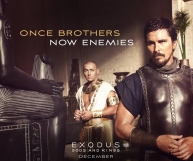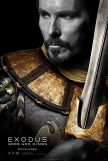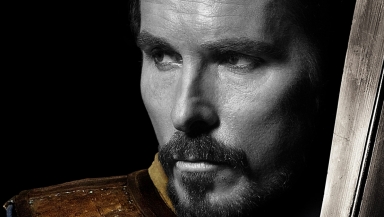
Should you go and see Exodus? If you are looking for classic Ridley Scott movie along the lines of 'Gladiator' or 'Alien' then sadly, no. 'Exodus: Gods and Kings' is nowhere near as innovative. And if you're hoping for a biblically faithful retelling of the book of Exodus – then again, no. Scott plays fast and loose with the scriptures, making some huge deviations for artistic effect. But, if you want a talking point movie that will make you gasp, think and wonder then this film is a real treat.
There are so many brilliant conversations that can be had off the back of this film. Here are a few.
1. Why do these big stories endure?
Ridley Scott is not afraid of a big story. Whether it's the supreme feminist movie of the 90s 'Thelma and Louise', the genre-defining sci-fi classic 'Alien' or the heroic icon 'Gladiator', Scott has a full house of genuinely epic must-see movies under his belt. Scott is rich and successful enough that he doesn't need this film, and yet somehow this biblical story has got under his skin and he has given years of his life to bring it to the screen.
The book of Exodus is part of the five-part origin narrative, not just of the Jewish nation, but of humanity itself, and these stories will not go away despite secularist cynicism and mockery. Indeed, Scott's movie comes hot on the heels of Darren Aronofsky's 'Noah', and rumours are circulating about Scott planning a biopic of King David.
2. Is God a delusion?
Scott makes some controversial choices. He gives Moses a handy head injury to initiate a conversion experience. When Moses speaks with God, it's clear that everyone else just sees Moses speaking to himself. A naturalistic counter-narrative is offered to the miraculous plagues, and even the parting of the Red Sea coincides with a meteor strike and a resulting tsunami. Is Scott trying to demythologise the story, looking for an escape route to placate atheist critics, or avoid the truth of the miraculous interventions of God and their implications? Are we supposed to conclude that God is simply a delusion?
But, even in Scott's suggestion that the miracles in Exodus are coincidental events, there is no arguing with their supernatural timing. Just when Moses is telling Pharaoh to let God's people go, the Nile turns to blood and the plagues begin. And when Israel needs an escape route out of Egypt, a way through the sea opens up.
For me, the words that appear on the screen at the start of the film are instructive: "After 400 years in slavery in Egypt the Hebrews had not forgotten their homeland... or their God. And God had not forgotten them." A faith that endured that long under those conditions is testament to the reality of God, as is the incredible account of the liberation of a minority ethnic group from the Egyptian superpower. So is the fact that thousands of years later these stories are still being retold. God has not forgotten us and we have not forgotten him. We are still a God-haunted culture.
3. What does God look like?
It is notoriously difficult to portray God on film. A disembodied voice doesn't really seem to cut it at this moment in cinematic history. We've already seen Morgan Freeman play God and subvert the caucasian stereotype, and now perhaps it's time to subvert Freeman's mild-mannered septuagenarian God. British actor Isaac Andrews was just 11 years old when he was called upon to play literally the biggest role in the universe.
But it seems that Andrews has been asked to portray God as moody, malevolent and mischievous. Christian Bale, who plays Moses, has been quoted describing God in the Exodus story as "Mercurial", and Scott has definitely made his God character fickle and erratic. This is seen clearly in Scott's handling of one of the the most difficult passages in the Bible: God's decision to make the last of the ten plagues the killing of the first born son in every Egyptian household. There is an angry shouting match between Moses and God. Moses argues that this is barbaric revenge and says he will have no part in it. The events of the Passover are thus portrayed as a bad decision made by a stroppy child.
This is religious art – a riff on the biblical story, not a faithful re-enactment. But in this depiction of God I think Scott has unhelpfully infantilised God, defamed his character and belittled his glory. This is perhaps a sign of the times, that a visionary director such as Scott either sees God has insignificant or wishes to depict him as such. But despite my reservations, Scott has also desentimentalised a relationship with God. Too often movies have portrayed spirituality as some kind of ecstatic state of perpetual serenity. Scott has read enough of the book of Exodus and the Psalms to know that a relationship with God can be loud and argumentative. And he seems to understand that God doesn't have to fit our expectations or traditions
4. Whose side are you on?
For a movie maker who loves the idea of a romantic hero – a lone figure who uses all his rhetoric, intellect and skill in combat to overcome an impossible enemy – it's not surprising that Moses is recast as a military genius leading a terrorist uprising against the Egyptians. There's a classic montage where Moses trains people to fight with swords, bows, arrows and, strangely, explosives. The film later turns into a face-off between Rameses and Moses, almost culminating in hand to hand combat in the middle of a tsunami.
This relationship reminded me of the Dreamworks animation 'The Prince of Egypt' (which gets a name check mid-movie by the way). As I watched this 'Exodus' in the middle of the pre-Christmas rush, the question in my mind by the Exodus story was 'Are you on God's side?' Our version of Christmas favours the rich – those who can afford all the trimmings, the latest tech, and expensive outfits. But the Exodus story is clear that God was not on the side of the excesses of the Egyptian aristocracy, he was on the side of the poor and downtrodden.
Super Special Effects
This film is a visual feast. There are some absolutely breathtaking shots and the set pieces are done with relish. The Ten Plagues are aesthetically lavish, the panoramic views of ancient Egypt are spell-binding, and of course the closing (rather than the parting) of the Red Sea leaves you, along with the Egyptian army, gasping for breath.
But sometimes a feast can be too indulgent. Scott seemed to have more CGI budget than he needed, so we get crazy crocodiles in the Nile that turn the river red, a shark in the Red Sea, not to mention redundant tornadoes and landslides wiping out Egyptian charioteers. As if the story wasn't big enough already, Scott chucks in some extra embellishments.
Thanks to the charity Damaris I was given a ticket to the 'Exodus' world premier in London's Leicester Square. As I made my way along the red carpet I heard voices shouting "Christian, Christian, Christian" I looked around wanting to say "Yes that's me and I am not ashamed" but it turns out that they were calling for Christian 'batman' Bale who was ahead of me on the carpet.
As I left the cinema having being moved, provoked, angered and delighted in equal measure, I was encouraged that a huge global audience will get to wrestle with a fresh retelling of this powerful story. My prayer is that many would see the movie and be driven back to the Bible to read the full story of Moses. As they read, I pray they would come to know the full story of the God who hears the suffering of his people, brings us life and liberty, and offers us all an intimate relationship with himself in all of his ferocious grace.
Dr Krish Kandiah is the president of London School of Theology, the largest interdenominational, evangelical theological college in Europe. He is also the founder of Home for Good, a start-up charity helping to find adoptive and foster homes for children in the care system.
Damaris Trust has produced resources to help engage with the film.










